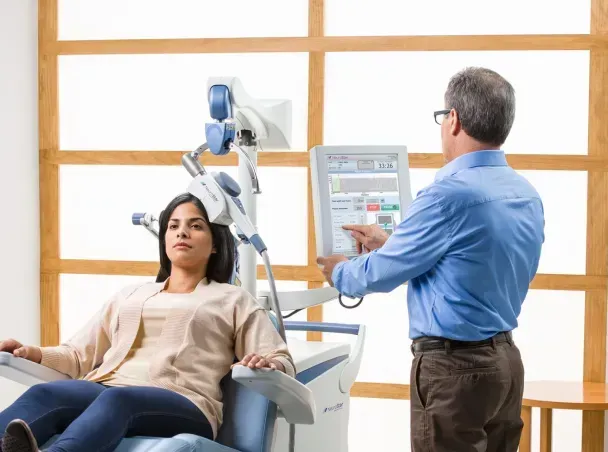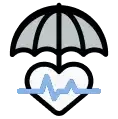
Welcome to Our landing page
Transforming Lives through TMS Therapy
We're the depression specialists. Our mission is your remission
from depression
Welcome to Our landing page
Transforming Lives through TMS Therapy
We're the depression specialists. Our mission is your remission from depression
What is TMS Therapy?
Transcranial Magnetic Stimulation (TMS) Therapy is a non-invasive, FDA-approved treatment for individuals struggling with depression that hasn't responded adequately to traditional treatments such as medication or psychotherapy. It is a revolutionary procedure that utilizes magnetic pulses to stimulate specific areas of the brain known to be associated with mood regulation.

What is TMS Therapy?
Transcranial Magnetic Stimulation (TMS) Therapy is a non-invasive, FDA-approved treatment for individuals struggling with depression that hasn't responded adequately to traditional treatments such as medication or psychotherapy. It is a revolutionary procedure that utilizes magnetic pulses to stimulate specific areas of the brain known to be associated with mood regulation.
A different way to treat depression
Is TMS therapy for you?
Non-drug and FDA-cleared
Non-invasive with no drug-related side effects.
Covered by most insurance
We handle the paperwork.
Fits into your existing treatment
Can be stand-alone treatment or along with your existing medication.
Zero downtime
Drive yourself to and from treatments. Get back to your day right away, including work or school.

Is TMS therapy for you?
Non-drug and FDA-cleared
Non-invasive with no drug-related side effects.
Covered by most insurance
We handle the paperwork.
Fits into your existing treatment
Can be stand-alone treatment or along with your existing medication.
Zero downtime
Drive yourself to and from treatments. Get back to your day right away, including work or school.
Take the First Step Today
We are covered by major insurance companies
Our team works directly with insurance companies to get coverage, file and process claims, and help with appeals when needed.

FDA-cleared
treatment.

Covered by most insurance plans

We handle all the paperwork.
customers about us

I cannot say enough about the degree of care and the amount of time Evolve Health spent in helping me with my cause. Upon becoming approved for Spravato™, I was scheduled to begin treatment. From day one, everyone at Evolve Health was very attentive and caring. I appreciated the fact that my care and interest were first and foremost during every treatment. After several weeks, with the help of Evolve Health, my overall condition has improved greatly, with continued improvement. There is no way I can truly thank everyone at Evolve Health for helping me and my family. Only, as many have already said, I have my life back.
- G.P.

My nurse brain can really take a break knowing that I am totally safe, and that if something did happen, Jill and her team would know immediately, and know exactly what to do. I am also psychologically safe. The treatments are a time for me to work on my brain stuff. That is hard work, but I know I’m surrounded by people I trust. That is such a huge deal. They are healing me, just through that relationship. The medication helps too, but none of it would matter without the people at Evolve Health.
- Female Patient, Age 37

From my initial consultation, the staff of Evolve have been attentive, kind and gentle, as well as professional and efficient. When my insurance company balked at reauthorizing me for treatment – a treatment that was miraculously effective – Jill was my tireless advocate in insisting they continue to cover my access to the care I need. Evolve staff courageously continued to serve patients as Coronavirus struck, and I want to especially praise the dedication of Jill, Stephanie and Taylor at that time. I wish every patient who needs it could have access to the kind of cutting-edge treatment and the compassion I have been so privileged to receive at Evolve Health.
- Female Patient, Age 63
Frequently Asked Questions
What is TMS therapy, and how does it work?
TMS therapy involves the use of a magnetic coil placed near the scalp to deliver repetitive magnetic pulses to specific areas of the brain. These pulses stimulate nerve cells in the brain regions associated with mood regulation. The exact mechanisms of how TMS works are not fully understood, but it is thought to help reset neural circuitry and alleviate symptoms of depression and other mood disorders.
Who is a candidate for TMS therapy?
TMS therapy is typically recommended for individuals who have not responded to or have had limited success with antidepressant medications. Candidates for TMS often have treatment-resistant depression (TRD) or other mood disorders, such as obsessive-compulsive disorder (OCD) or bipolar disorder. A healthcare provider will assess a patient's specific condition and history to determine if TMS is an appropriate treatment option.
What can I expect during a TMS treatment session?
TMS sessions are generally administered on an outpatient basis. During a session, you will be seated in a comfortable chair, and a magnetic coil will be positioned on your scalp. The coil will then deliver a series of magnetic pulses to your brain. Each session typically lasts about 20-40 minutes and is usually administered five days a week for several weeks. Most patients can resume their daily activities immediately after a session, as there is no anesthesia or recovery time required.
What are the potential side effects and benefits of TMS therapy?
TMS therapy is generally well-tolerated, and the most common side effects are mild and temporary, including scalp discomfort or headache during or after a session. The benefits of TMS therapy may include a reduction in depressive symptoms, improved mood, and an overall enhancement in quality of life. It is important to note that individual responses to TMS may vary, and not everyone will experience the same level of improvement.
© 2024 Evolve Health. All Rights Reserved.






